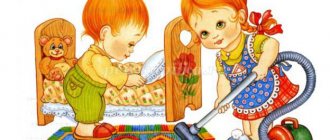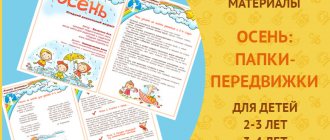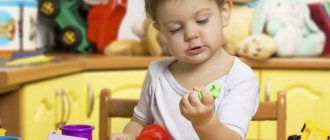MAGAZINE Preschooler.RF
Consultations for parents “Healthy lifestyle for your children”Children, as you know, are a product of their environment - it shapes their consciousness and habits. Therefore, a healthy lifestyle must be developed starting from childhood: taking care of one’s own health as a core value will become a natural form of behavior.
So what is health? It would seem that the simplest answer should be that health is the absence of disease. But this is not enough to explain to a child. Health is happiness! Health is when you are cheerful and everything works out for you. Everyone needs health - children, adults, and even animals. In developing concepts about a healthy lifestyle, you need to make it clear to children what they need to do to be healthy? You need to want and be able to take care of your health. If you don't take care of your health, you can lose it
The concept of a healthy lifestyle includes many aspects.
This is firstly: adherence to the daily routine.
In kindergarten, the regime is observed, as this is one of the important conditions for ensuring the activities of the preschool institution. But at home, the routine is not always followed; children need to be taught to go to bed early and get up early.
Secondly: these are cultural - hygienic skills.
Children must be able to wash themselves correctly, know why they need to do it: to be clean, to look good, to feel pleasant and have healthy skin, to be hardened, to wash away germs.
- To consolidate skills, it is recommended to use artistic expression and dramatization of game situations.
Wash yourself with soap! Do not be lazy! Don't slip out, don't get angry! Why did you fall again? I'll wash you first!
About microbes:
A microbe is a terribly harmful animal, insidious and, most importantly, ticklish. Such an animal will crawl into your stomach and live there quietly.
The rogue will climb in, and wherever he wants, he walks around the patient and tickles him. He is proud that he causes so much trouble: runny nose, sneezing and sweat.
Did you children wash your hands before dinner? Oh, brother Fox, you look like you have a cold. Wait a minute, your forehead is hot. There must be a microbe inside you!
Together with your children, consider situations of protection from germs and draw a conclusion that children should learn well: do not eat or drink outside; always wash your hands with soap,
returning from the street, before eating, after using the toilet. Invite children to count how many times a day they have to wash their hands; eat only washed vegetables and fruits; when you sneeze or cough, cover your mouth and nose with a tissue; eat only from clean dishes.
Thirdly: these are gymnastics, motor activity, hardening and outdoor games. If a person plays sports, he will live longer. “Take care of your health from a young age.” Children need to know why they say this. Be sure to do gymnastics daily.
Fourthly: food culture. Playing out the situations “Visiting Mishutka” and “Winnie the Pooh visiting the Rabbit”, looking at and discussing pictures for the games: “Beware of the virus”, “Be healthy!”. Tell children that vegetables and fruits contain a lot of vitamins A, B, C, D, what foods contain them and what they are needed for. For better memorization, you can use a literary word.
I never lose heart, And there is a smile on my face, Because I take Vitamins A, B, C.
It is very important to eat oatmeal at breakfast early in the morning. Black bread is good for us, and not only in the morning.
Remember the simple truth, Only those who chew raw carrots or drink carrot juice see better.
Oranges help against colds and sore throats. Well, it’s better to eat lemon, even though it’s very sour.
Games on the Basics of a Safe Life and on the Rules of the Road help in creating a culture of a healthy lifestyle.
Just talking about the importance of health is not enough; it is necessary to take daily, albeit small, but certainly numerous steps. Then a healthy foundation will certainly be formed on which a beautiful edifice of human life can be built in the future. So let's teach our children from a very early age to take care of their health and take care of it! "Movement is the basis of health"
Everyone knows how important movement is in human life. But the distance between knowledge and practice is often very large. Meanwhile, it is also known that people who train their muscular system, even if it is very small, but certainly through daily activity, are much less susceptible to accidents and illnesses. Statistical data from the practice of children's doctors, medical commissions and insurance companies indicate the extreme importance of movement and proper nutrition in the lives of children and adults.
Very simple, non-boring advice for parents on the problem: “Movement and health”
The human brain, especially when it comes to unconscious thinking, is saturated
impressions. In the future, 80% of our activities are guided by this
unconscious experience. Therefore, educating children about the needs of a healthy body, training, and training play an extremely important role, both in kindergarten and in the family. It is necessary to explain to children the significance of not only certain actions and habits, but this is the main thing - to set their own example.
Do morning exercises, move more, engage in physical exercise and sports, lead a healthy lifestyle, involve your children in active activities and they will grow up to be healthy and successful people. Parents are an unquestioned authority for children, they will accept them as role models.
From an early age, teach your children to take care of their health and take care of it. Joint activities unite and unite children and adults. The position of parents largely determines the attitude of children towards physical education and sports. If adults lead a healthy lifestyle, regularly perform at least the simplest physical exercises with their children, are active and easy-going, this is “fertile soil” on which good seedlings will sprout - strong, healthy children who love physical education.
Just talking about the importance of health is not enough.
We must take daily, albeit small, but certainly numerous steps. Then a healthy foundation will certainly be formed on which a beautiful edifice of human life can be built in the future.
Participate more often in physical education and sports activities held in kindergarten. Children enjoy the presence of adults and are proud of their parents. Sports holidays in which family teams compete bring the family together, bring a lot of joy and are remembered by adults and children for a long time.
Organize holidays for your children at home; spare no time or effort. All this will pay off in the health of your child, his active life-affirming position, and further success in life.
The best days are Saturday, Sunday, holidays, holidays, vacation.
Anyone can command - mother, father, grandfather, grandmother, son or daughter, aunt, uncle, etc. You can the “periods” and then everyone is responsible for their own “event” their own period of time.
In the morning, while still in bed, do a few muscle stretching exercises:
- Lie on your back, stretching your legs and arms, stretch your whole body
- Tighten your feet and toes
- Moving your arms far behind your head, spread your palms, extend your fingers, inhale
- Then relax, moving your arms along your body, and exhale.
It is good to accompany the exercise with thoughts or words, saying them in a whisper or out loud: “Good morning! How good! I am well! Everyone is healthy! I love my family!"
- From the same starting position, placing your arms bent at the elbows under your head, stretching your legs (you can hook your toes onto the headboard of the bed or hide them under a folded blanket), do several half-lifts of the upper body, without lifting your legs from the bed.
- Lying on your back, arms straight along the body, or elbows bent under the head, raise your legs up several times, trying to make a “right angle” .
— Continuing to lie on your back, perform several rotational movements with your palms and feet in one direction and the other.
- From a position lying on your back, with your arms and legs stretched out, roll over onto one side, onto your back, onto the other side, onto your stomach.
- From the starting position, lying on your stomach, stretching out your arms and legs, make a “boat” , bending in your back, raise your head, upper torso, legs.
Say: “Okay! Very good!" Stand up.
It is worth repeating the exercises from two to four times with a smile and a good mood.
The general uplifting command coming from the other room is very invigorating, uniting the whole family with a common idea, a common action, a common cheerful mood, saturating everyone with positive emotions.
"Hello everybody! Hello everyone!"
Joint gymnastics in a large room or hallway - what could be better?! The exercises are the simplest and accessible to all family members from the smallest to the largest. Improvisations and imitative movements are especially good.
Shower! From this morning procedure, everyone, especially children, will enjoy a real fun water holiday.
Now for a delicious breakfast! After all, this is the most important meal of the day. That's why we don't eat breakfast on the go. A beautifully set table, favorite dishes, loved ones - how wonderful it is! Over breakfast we have peaceful conversations about the day ahead, including the needs of the body.
Then all sorts of calm, active yard games, initiated by all family members. Grandparents will offer to play old folk games, dad and mom will offer to play the games of their childhood, and children will offer to play modern outdoor games. It will be interesting and useful for everyone. Play games such as: “Forfeits” , “Don’t say yes and no” , “Loto” , “Burners” , Salki” , “Kvach” , Bluff” , “Hide and Seek” , “Cossack Robbers” , “ Freeze" , "Colors" .
From home to the street, to nature.
A walk or excursion, a trip, a hike, a visit to cultural and entertainment institutions, parks, children's attractions, and theaters are required. Talking about the beneficial effects of nature and recreation on health is helpful.
You can have lunch at the catering point. It is pleasant and interesting, and contributes to the social and communicative development of children.
Sit on a bench, admire the sky, river, trees, flowers, etc., breathe calmly - it is so peaceful, promotes relaxation, deep rest.
You can still move actively. Or visit the cinema. It is important that during the day the child performs various exercises: stretch, and then relax your muscles, and you will have a feeling of warmth throughout your body, tense your back muscles, squeeze your shoulder blades together, stand straight, lower and raise your head several times and you will have a beautiful posture.
In the evening at home there is a common dinner, hygiene procedures, quieter games, family reading (preferably fairy tales or entertaining stories - everyone loves them). If you can’t watch an interesting program together without TV, but not for long, it’s harmful for children.
Children going to bed. "Good night!" It is very good if children are sung a lullaby, sit next to him with kind words - such moments are remembered for a lifetime, they convince the child of his own security and importance for the family, awaken peace of mind in him, strengthen his health, help him to be confident and successful.
Be healthy!
| Next > |
Consultation for parents. world health day
Signs of diabetes in children
If all of the above factors converge, the child develops a latent form of diabetes. The disease is asymptomatic. Only parents who themselves suffer from diabetes or doctors can notice the first signs of diabetes in a child
. The baby's appetite changes dramatically, he begins to eat constantly, and cannot last long without food. Some children, on the contrary, begin to refuse food for no reason. In addition, the child is constantly thirsty. He drinks and drinks... And then at night he can wet the bed. The baby begins to lose weight, is constantly sleepy, lethargic, and irritable. As the disease progresses, the child experiences nausea, vomiting and abdominal pain. Most often, it is at this stage that inexperienced parents turn to the doctor. And it also happens that an ambulance brings a weakened child to the hospital, and the doctors have to fight for his life.
That is why it is extremely important to identify diabetes as early as possible, at a milder stage. How can parents understand that their child is developing diabetes? There are several special signs - an increased need for sweets, when cells just begin to receive less glucose and signal its lack. The child begins to tolerate breaks between meals poorly. And when he eats, instead of a surge of strength, he feels tired and weak. These signs are difficult to distinguish from children’s banal love of chocolate and the habit of constantly chewing something. But if you know that there are already diabetics in the family, you need to be vigilant and, if you suspect the development of the disease, contact an endocrinologist. The doctor will examine the child, and if it turns out that the functioning of his pancreas is indeed impaired, you will have to take measures to slow down the progression of the disease and preserve the baby’s health.
Diagnosis of diabetes mellitus in children
Modern medicine has many quick and accurate methods for diagnosing diabetes. Most often, to diagnose the disease, blood sugar levels are examined on an empty stomach and some time after taking glucose. Normal fasting glucose levels should be between 3.3 and 5.5 mmol/L. If there is more glucose in the blood than 10 mmol/l, this indicates the development of diabetes mellitus. In addition to a blood test, a urine test for sugar content, as well as a study of its specific gravity, which usually increases in diabetes, is also quite informative.
Doctors strive to diagnose the disease as early as possible. For this purpose, special tests for antibodies to beta cells are used. These cells produce insulin, and with a high titer of antibodies to them, one can assume the onset of diabetes mellitus.






